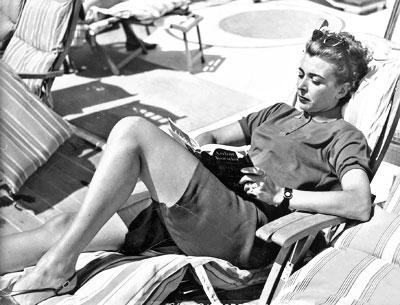Portrait of a Backstage Dervish

“Toughing It Out”
Claire Reed
Feminist Press, $18.95
Privileged people “should make use of our security, our seniority, to take risks, to make noise, to be courageous, to become unpopular.”
Claire Reed quotes that imperative, from the feminist literary scholar Carolyn Heilbrun, late in her just-published memoir, “Toughing It Out: From Silver Slippers to Combat Boots.” It justly sums up the bulk of her life. A frequent visitor to East Hampton and at one point a full-time resident, Ms. Reed gives a poignant case study of an important but little-sung role in the drama of most nonprofit organizations — the relatively anonymous volunteer who raises the money and makes the wheels go round.
A dervish and, judging from events she organized, a terrific executive, Ms. Reed has played major staff roles in such progressive movements and organizations as disarmament (Women Strike for Peace), civil rights (the Student Nonviolent Coordinating Committee), feminist politics (the National Women’s Political Caucus), and, above all, in the successful campaign for Congress and later political activities of Bella Abzug.
In one of her few paid jobs, Ms. Reed was “in charge of introducing Medicaid to people on the west side of Manhattan,” training staffers and speaking three or four evenings a week at churches, synagogues, and clubs. At the age of 92, she remains active on the boards of the Bella Abzug Leadership Institute, which trains poor and minority women for political roles, and the National Economic and Social Rights Initiative, a legal advocacy organization.
But first she had to overcome the stifling pull of women’s all-day golf outings at the country club. One of the book’s virtues is its portrayal of how unrelentingly difficult it can be for women to overcome the societal pressures to subordinate themselves to men, especially in their innermost thoughts. Raised in comfort on Brooklyn’s Bedford Avenue by a prosperous men’s clothing manufacturer father and a mother who held the common view that the best college degree for a woman would be an M.R.S., she colorfully recounts her wealthy version of what Betty Friedan dubbed the feminine mystique.
Early in her first marriage, she found herself at big parties in a gilded neighborhood of suburban Harrison, N.Y. “There was always an orchestra and dance floor. . . . Orchids were the favored centerpieces on each table and the place settings were Spode china, crystal glassware, and sterling silver flatware.” Department store clerks greeted her by name.
She quickly found that way of life “gaudy, ostentatious, and offensive” and realized she was more fascinated by books, theater, and classical music, but she had a hard time finding an alternative. Her husband, who several times took her to Europe on the Queen Mary (she read Koestler’s “Darkness at Noon” in her deck chair), complained that she was so involved in local politics she was neglecting her children, “but when I spent the same amount of time shopping, there was no complaint. That was what women were supposed to do.”
Even now, Ms. Reed says that in the back of her mind, “It seems I still cannot muffle the constant, irritating buzz that translates to She’s dumb, she’s dull, she’s dense. She’s a first-rate actor, performing as a stand-in for an intelligent woman.”
Nevertheless, that didn’t keep her from co-chairing the local chapters of the United Jewish Appeal and the Muscular Dystrophy Association and working for the League of Women Voters. Soon she was working against the re-election of Harrison’s Republican supervisor and running the headquarters there of the 1952 Adlai Stevenson presidential campaign. Next came peace marches.
At a march for disarmament she met “a heavy-set, rather imposing figure wearing a wide black hat, who kept mumbling under her breath. After several minutes, I asked her why she seemed so annoyed and angry. Oh, she answered impatiently, this is all well and good but it’s not enough. As a well-trained member of the League of Women Voters, I answered that we should be demanding action from our legislators and should be lobbying and working in the political clubs. Immediately, she stopped, turned to look at me intently, and said, You are coming with me.”
In what turned out to be Bella Abzug’s law office, “she handed me a notebook and pen and told me to start writing. Without reading from notes, she listed each phone call she wanted to make, the names and positions of those to phone, and what I was to request of them. Her mind was an express train. Yet she was patient. After I had written several pages of notes, she said, I think that’s enough for now. Call tomorrow when you’re done and report back to me. Tomorrow, I thought, is she nuts?” Yet “I left dazed, electrified, and jumping with excitement.”
Ms. Reed calls Abzug “an engine of energy and power,” adding that she “was for me what God must have been to Moses when he commanded Moses to lead his people out of Egypt. . . . I discovered I had barrels of energy and loved challenges. . . . I’ve been called a political wonk, a person buried in politics, a political work horse. Those names don’t matter to me; I love every action in the political handbook.”
I have attended several dinner parties at Claire Reed’s house and can attest that she is still going strong. When a fellow panelist on aging talked about how “younger women and men were oblivious of the older generation,” she writes, “I turned her observations around. Society’s disdain for the aged gives us the confidence to try new things. . . . If you fall on your face, no one is watching . . . so go with it. Be whatever it is you want to be.”
Christopher T. Cory, a freelance editor, is a former correspondent for Time magazine. He lives in East Hampton.
